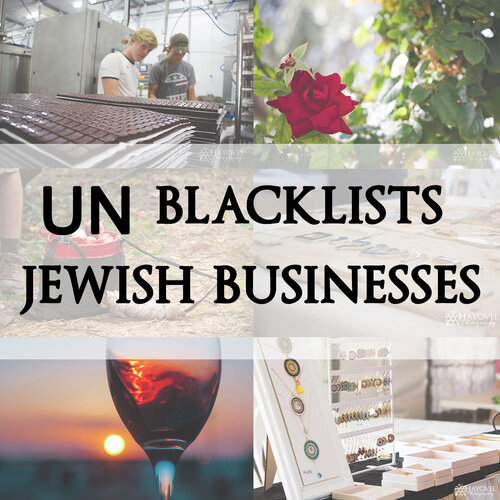I would like to compare the following two statements:
“A world power publishes a list of Jewish businesses to boycott at the behest of a certain political party.”
“An international entity publishes a list of Jewish businesses to boycott at the behest of a liberal movement.”
These statements are almost identical. I purposely kept them generic. Now I will add the names, dates and places and compare them again.
“April 1st, 1933 – Germany publishes a list of Jewish businesses to boycott at the behest of the Nazi party.”
“February 12th, 2020 – The UN publishes a list of Jewish businesses to boycott at the behest of the BDS movement.”
Am I making this up? Nope. Unfortunately, it is all very true.
On February 12th, the UN Human Rights Council released a blacklist detailing 112 businesses that are accused of “crimes” that have to do with operating in or supporting Jewish life in Judea and Samaria. Ironically, 94 out of the 112 businesses are Jewish-owned. Is this a UN blacklist, or is this really just Jew hatred?
Well, I have news for the UN – this is not 1933, and we are not in Nazi-controlled Germany.
Here are just a few of the “crimes” that these businesses are accused of according to the UN:
The supply of equipment and materials facilitating the construction and the expansion of settlements and the wall, and associated infrastructures.
The expansion of settlements is another way to refer to the growth and development of life in the Jewish communities in Judea and Samaria, now totalling some 800,000 residents. As far as the wall they’re referring to, it is a divider made up of 97% fence and 3% wall that Israel built during the Second Intifada in the year 2000 when Palestinians were murdering Jews on a large scale. When the wall/fence was built, terrorism and murders went down 95%.
The provision of services and utilities supporting the maintenance and existence of settlements, including transport.
This crime says that the Jews don’t have a right to live, prosper and flourish in the biblical heartland. The part about transport is what gets me. That the Jews don’t have a right to transportation sounds eerily familiar to the history of pograms, racism and apartheid throughout the world.
The use of natural resources, in particular water and land, for business purposes.
They are saying that Jews don’t have a right to natural resources, including water.
Pollution, and the dumping of waste in or its transfer to Palestinian villages.
This is a blatant lie. Anyone who has been to Israel or any Arab villages can verify that Israel doesn’t go around dumping their garbage or waste on the Palestinians. It is true that Jewish communities are generally cleaner than the Arab villages, but that is because of the difference in culture.
There are more so-called crimes that businesses on the UN’s blacklist are supposedly committing, but I think you get the point. There comes a time when we need to remove the thin mask of the so-called BDS movement and call it what it is: Jew hatred. And to the UN, I would say again: this is not 1933, and we are not in Nazi-controlled Germany.
Thankfully, we still have strong leaders in the world that are attempting to hold the UN accountable. Former U.S. ambassador to the UN Nikki Haley tweeted this about the UN’s latest round of Jew hatred:
“The UN hit a new low today publishing its Antisemitic blacklist of companies it claims are involved in Israeli “settlement activity.” The timing of this after the U.S. released a peace plan is conniving & manipulative at best. Shameful.”
The United States withdrew from the UN Human Rights Council in June of 2018, calling its passage of numerous resolutions critical of Israel “clear proof that the council is motivated by political bias, not human rights.”
General Mills is one of the businesses who were blacklisted because they operate a manufacturing facility that makes Pillsbury products like bread and croissants in an industrial park in the East Jerusalem neighborhood of Atarot. Ironically, half the workers at this General Mills factory are Palestinians who receive full social benefits without prejudice to race, religion or nationality.
So in the UN’s attempt to condemn Israel, blacklisting Jewish businesses that work in the so called “West Bank,” they may just be hurting the Palestinian people more than anyone else. The General Mills factory in east Jerusalem is just one example of coexistence that is happening on a grassroots level all throughout Judea and Samaria. There are tens of thousands of Palestinians who find jobs working with Jewish companies every single day.
At the end of the day, God’s Word is very clear. Those who bless Israel will be blessed, and those who curse Israel will be cursed. His blessing began with Abraham, and continues on today. It is our responsibility to align with that blessing. Even if we’re placed on a dirty dozen list.

